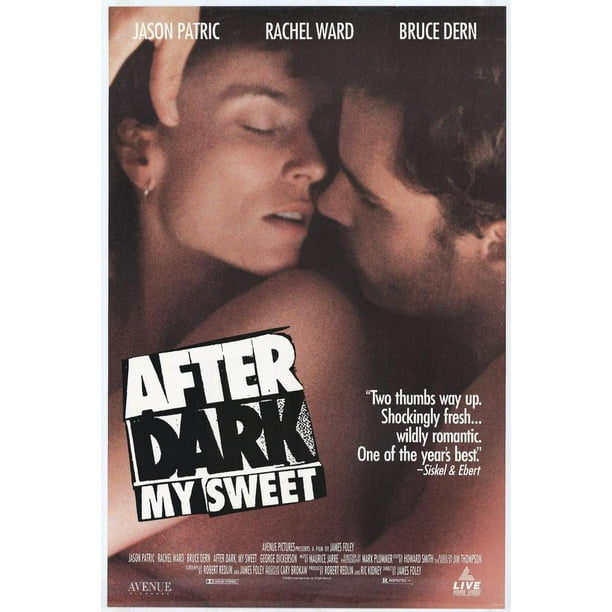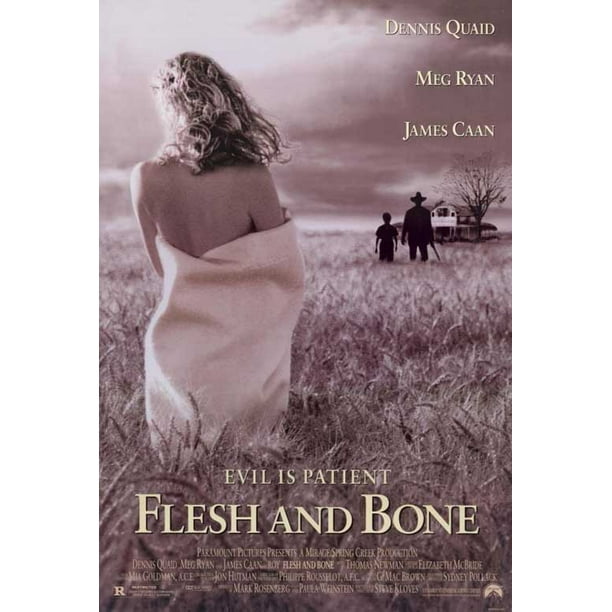FLESH AND BONE (1993) 7/10
One of Imprint Editions' most compelling Blu-Ray boxes to date is new this month: the AFTER DARK: NEO NOIR CINEMA COLLECTION, a 6-film anthology that offers a curated journey down modern film noirs of the 1990s, reviving several long-forgotten films back from the brink of obscurity (I'll be reviewing these as I go along over the next week or two).
What's interesting about this lavish, multi-studio licensed collection are the films that many critics chose to champion at the time of their release, and which ones were nearly dismissed outright upon their original theatrical debuts.
In terms of comparing and contrasting with the prevailing critical consensus of the '90s, two pictures I had a divergent reaction to were James Foley's 1990 adaptation of Jim Thompson's noir book “After Dark, My Sweet” and Steve Kloves' original screenplay “Flesh And Bone,” which the future “Harry Potter” scribe directed, coming off his 1989 triumph “The Fabulous Baker Boys.”

AFTER DARK MY SWEET (111 mins., 1990, R) may be a film that Thompson devotees admired at the time – Roger Ebert lavished it with 4-star praise – but truthfully I found it to be an unappealing updating of one of Thompson's '50s noir pieces.
Jason Patric, never one of my favorites, plays an (apparently) mentally troubled ex-boxer who crosses paths with a widow (Rachel Ward) about to pull off a kidnapping with the help of a former cop (Bruce Dern) near Palm Springs. Things, naturally, don't go as planned in a movie that doesn't really evoke the kind of claustrophobic tension and mood one associates with these types of films – its aesthetic seems firmly anchored to the early '90s in terms of its look and feel – while the universally off-putting characters make it hard to care about what happens to any of them. The casting likewise doesn't help – Patric's overly articulated performance doesn't come off as convincing, while Ward is little more than serviceable in a plum role you could envision any number of other actresses of the era better fitting into.
Maurice Jarre's electronic score ends up being less aggressive than one might expect and one of the film's more positive assets, but ultimately, it took me numerous viewings to get into “After Dark, My Sweet,” which James Foley – whose odd career took him to the heights of David Mamet (“Glengarry Glen Ross”) to the depths of the “50 Shades” sequels – helmed to mostly positive critical notices.
A small release from Avenue Pictures, which produced the acclaimed “Drugstore Cowboy,” Imprint's Blu-Ray here debuts on disc a perfectly serviceable, Lionsgate-licensed 1080p (2.35) transfer with a nicely mixed 2.0 DTS MA soundtrack. Superb extras – as they are throughout this set – offer new commentaries by Foley as well as critic Travis Woods, plus recent interviews with Foley, Patric (who discusses his entire career), Dern and Thompson expert Robert Polito, plus the trailer.

While “After Dark My Sweet” was something of a critical darling, FLESH AND BONE (126 mins., 1993, R) was instantly dismissed by most critics. It didn't help that this picture wasn't a small independent movie but rather a big studio film with some unfortunate baggage: stars Dennis Quaid and Meg Ryan were near the height of their box-office appeal and, then married, generated nearly as much publicity off-screen as they did on it. This third teaming for the duo following 1987's “Innerspace” and “D.O.A.” (1988) was produced by Sydney Pollack and set up at Paramount, which slotted the film as a nationwide release in early November '93.
None of this helped the moody, elegiac “Flesh and Bone,” which had mainstream critics castigating the picture as a vanity project for its stars, which is unfortunate because – while not a great film – “Flesh and Bone” has some very compelling components working for it. This isn't a particularly suspenseful movie, it's not even as “noir-ish” as some of the other pictures in this set – but if you're looking for an atmospheric, beautifully shot mood piece that captures time and place, and is also well acted by two stars in their prime, then “Flesh and Bone” can cast an appropriately haunting spell on the right viewer.
Kloves' original script begins with a young boy venturing into a family's remote Texas farm house – he's promptly greeted by the parents, who are then – along with their son – slain by the boy's father (James Caan), leaving only their infant baby girl alive. Flash ahead decades and the boy has grown into Dennis Quaid's stoic Arlis, an emotionally disconnected man servicing vending machines across small, mostly barren Texas towns. He ends up meeting a woman named Kay (Meg Ryan) in a troubled marriage and with a sad family history – and while what happens between them is predictable, Kloves' script doesn't utilize its plot to surprise the viewer. Instead, you're meant to be aware of what's happening at every moment, and as fate plays out both for them and Quaid's father (who, of course, makes a return appearance), the viewer feels the mounting buried pain and anguish in Arlis, who has spent a lifetime of misery through the sins of his parent.
While I found it difficult to get into “After Dark My Sweet,” “Flesh and Bone” was a movie I had a hard time turning off. Cinematographer Philippe Rousselot does an outstanding job capturing the roadside lives of these characters, and Kloves manages to generate a quiet sympathy for them throughout. Quaid and Ryan had a lot of chemistry on-screen and the movie even lightens up a little in a section where their relationship blossoms – naturally, this isn't an especially uplifting movie in any regard, but while it ends up in a place you'd expect, it's also minus some of the dramatic twists you might be expecting. The level of restraint in the film is commendable, but may also have kept some critics and audiences – those expecting conventional Hollywood formula, and more overt dramatic fireworks, to eventually manifest themselves – at bay.
Both Quaid and Ryan are excellent here, and Gwyneth Paltrow makes a striking early screen performance as Caan's moll. Speaking of Caan, he's arguably the picture's weakest element, chewing up too much of the scenery in a film where so much is underplayed, right down to Thomas Newman's atmospheric score.
“Flesh and Bone” makes its Blu-Ray debut here with a superlative 1080p (1.78) AVC encoded transfer. The 5.1 DTS MA sound is expertly engineered with a less enveloping 2.0 PCM track also included. Supplements include a commentary with Kloves, accompanied by a moderator, plus interviews with editor Mia Goldman, production designer Jon Hutman, and the trailer. There are also archival EPK interviews with Caan, Paltrow and Quaid on-hand (note Paramount is releasing an extras-free Blu-Ray disc of “Flesh and Bone” stateside next week).